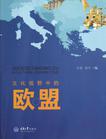文化视野中的欧盟
2011-8
重庆大学出版社
石坚
405
In the implementation of Jean Monnet Chair Professor Project (Jean Monnet Chair 2008-2753),we have offered a comprehensive series of graduate studies courses for the students at M.A.and Ph.D.levels from interdisciplinary backgrounds,and the students of economics,political science, linguistics,literature,culttual studies and history take same classes and participate in discussions.This kind ofinterdisciplinary leaming platform is a wonderful starting point to guide the graduate students into a wider and up-to-date perspective for their academic studies of EU,making them acquainted with the current issues in European and EU studies,and helping themin their practical research work in the area.In the lecture series and existing courses,the professors, guest speakers and scholars both intemational and home have noticed that the students in one way or another lack a comprehensive knowledge about EU and EU integration,and they,with their various discipline backgrounds,need a common ground for their discussions.For this purpose we have decided that compiling a Reader for the students of European Studies is necessary,and either for a course or to those students who have the interest to explore EU,particularly EU integratign,a collection of academic papers would be most helpful.
Part One The OverviewThe Ventotene ManifestoReconstruction,Reconciliation, and Integration, 1945-1957 A Ferment of ChangeThe Emerging European Union,1993-1999European Union and GlobalizationThe Lisbon Treaty:The End of the European Community,after a Long and Glorious Life? Part Two The CritiqueCultural Studies, Complexity Studies and the Transformation of the Structures of KnowledgeMulticulturalism and Political Integration in Modern Nation-States—Thematic IntroductionSome Europein Their HistoryObstinate or Obsolete? The Fate of the Nation-State and the Case of Western Eu-ropeCitizenship and European integrationEuropean Identity-Between Inclusion and ExclusionThe Debate on European Values and the Case of Cultural Diversity Voiceless Submission or Deliberate Choice? European Integration and the Relation between National and European IdentityPart Three The PracticeEU Participation in the UNESCO Convention on the Protection and Promotion of the Diversity of Cultural Expressions:Some Constitutional RemarksConsuming European Identity:The Inconspicuous Side of Consumerism in the EUEU Film Policy: Between Art and Commerce"United in Diversity":The Church's Experience and the European Union'sIdentity MottoThe"Culturallndustries":A Clash of Basic Values?A Comparative Study of the EU and the NAFTA in Light of the WTOTimescapes:An Artistic Challenge to the European Union ParadigmNation,Citizenship and Immigration in Contemporary SpainAppendix:A Selected Booklist
1.The Discussion on"European Values":where does it come from,What does it consist of? Already before the"Buttigli one crisis"of October 2004,it had become obvious that"values"are highly topical in the context of European integration.Just fifteen years ago one could have speculated whether fin-de siecle Europe would no longer be a vehicle for values,but a mere end in itself which risks losing any deeper raison d'etre.However,it is the end of the last and the beginning of the new century which see the Union 1.The Discussion on"European Values":where does it come from,What does it consist of? Already before the"Bitingly one crisis"of October 2004,it had become obvious that"values"are highly topical in the context of European integration.Just fifteen years ago one could have speculated whether fin-de siècle Europe would no longer be a vehicle for values,but a mere end in itself which risks losing any deeper raison d'etre.How ever,it is the end of the last and the beginning of the new century which see the Union submerged in an omnipresent debate of unprecedented intensity on its underlying values,on ways to control the observance of these values and on the Union's constitutional identity in general. At last four factors can be cited for bringing discussion of values to a head: the drafting of the Charter of Fundamental Rights in 2000,the so-called Austrian crisis of the same year,the general turmoil in international politics following September 11 and,finally,the European Convention's drafting of the European Union's new constitutional treaty.This quadriga covers the entire range of"values",from attempts to define a specific catalogue of fundamental"rights"(within the Convention drafting the Charter) to a broader process of self-definition and identity building at EU level including also political issues such as the Union' s political objectives and its scope (within the Convention drafting the constitutional treaty).The question of how to react if a member state allegedly infringes (supposed) European values (which occured in the Austrian crisis) oscillates between law and politics.And,finally,the value debate provoked at the global.level by terrorist attacks raises political questions,such as how to design the transatlantic partnership and where to place Europe in the relationship between the no longer monolithic"West"and the even less monolithic Islamic world. Of course,the value debate in Europe cannot be confined to these recent and prominent for a Rather,every political system generates ongoing debate on val.ues and tries to resolve conflicts which a rise.These frictions and asymmetries call for repliesby the Courts as well as the political arena.The (so far) unique establishment of political criteria for accession to the EU in the recent eastern enlargement demonstrates how values such as e.g."respect for and the protection of minorities"are voiced at the political level but subsequently left to the legal system for further"digestion".In other cases,the question of common values arises when new areas of European legislative competence must be filled with concrete political content.This is happening in areas,such as e.g.the EU immigration policy.Yet,other debates arise from supposed or real legal friction between certain policy areas and the European Union's common market"skeleton":the"trade linkage problem"in the area of culture and the EU cinema policy are two examples. ……
